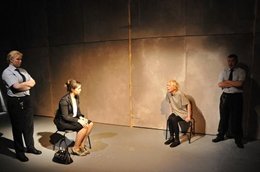A moment of madness costs a mother her daughter, and a grown woman her childhood memories. Meeting sixteen years later in a prison visiting room, one tries to fill in what's missing in the other, trading real life experiences for lost recollections as they re-establish a relationship where physical contact is forbidden.
Fay (Eileen Pollock) is serving life for the murder of her husband, the father of her child; Josie (Liz FitzGibbon) can't remember anything before the age of 12. Over the course of a year, they try to reconnect through weekly visits. For the former, it's a chance to live vicariously, to experience something past the eight o’clock “watershed” that dictates prison life; for the latter, it's a necessity, to put foundations on a "house built on mud".
The brilliance of Rona Munro's writing is that it hooks you with this very human relationship before uncoiling a series of set pieces which call into question the very nature of incarceration, before finally returning to the key question: what makes a person kill? Munro doesn't provide the answers – or an alternative – but as Fay draws us closer and closer to her, our desire to excuse or explain what she has done grows deeper.
As Fay, Pollock delivers an honest, kinetic performance. From the moment she is led into the visiting room to meet her daughter, you can see the effect that sixteen years' incarceration have had on her. Humped over, eyes wide with wonder, this is a woman whose only experience with the outside world has been the half hour meetings with her lawyers. As she becomes comfortable with her surroundings, Pollock becomes more free, transporting us – and Josie – beyond the four prison walls, back to the heady days of her courtship; to the Indian take-aways, skinny dips and pints in the pub that marked her life before she went in for the kill. "I think about your dad every day," she says to Josie.
Her sudden lunges into panic and despair are less well handled, as if the actress get too lost in the emotion causing the words to pile up in her mouth, which makes it difficult to make out her words. What she does succeed in imparting, however, is that this woman could exist – she could be your mum – and that there is more to this woman than her conviction.
 As Josie, FitzGibbon's performance was understated. There is a nervous delicacy to her portrayal, but her performance could have done with a bit more development throughout. You never quite feel that Fay means as much to Josie as the script suggests.
As Josie, FitzGibbon's performance was understated. There is a nervous delicacy to her portrayal, but her performance could have done with a bit more development throughout. You never quite feel that Fay means as much to Josie as the script suggests.
Staged in the round, Vanessa Fielding’s production makes good use of the space. Opening the show in the foyer, the audience is brought into the main staging area as if we are visiting an actual prison. Keith Ward’s suggestive set, comprised of raised platforms with metallic bars jutting out, hints at the oppressive atmosphere in which our characters meet. Dispersed throughout the circular space, the meetings between mother and daughter take place on a different platform each time, keeping the piece from feeling staid – a risk you run when so much of the action involves two people talking across a table. However, there is a problem with sight-lines: I couldn’t see any of the action that took place in Fay’s cell, and had to move seats on several occasions when key scenes were blocked by pillars.
The dehumanizing affect of the prison system is powerfully rendered by the sneers, searches and sudden suspension of visiting privileges. As the two prison guards, Sheila (Rebecca Grimes) and George (a solid David Gorry) symbolize the blurring of boundaries, the human face to our penal system. They need to be as rounded as the prisoners and their families to stop the piece becoming a polemic. However, Grimes brings Sheila’s antagonism too much to the fore, shunting her into a more villainous role and losing the audience’s sympathies. Rather than setting off alarm bells as to why she treats Fay with such contempt, we just dismiss her as the stereotypical bad cop.
Ultimately, Iron is an important and thought-provoking piece of theatre, which questions how we treat female prisoners without canonizing or patronizing them.
Caomhan Keane is the Senior Theatre Writer at Entertainment.ie